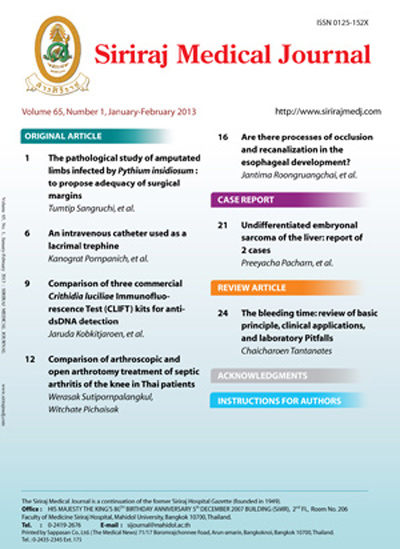Comparison of Temporary Interruption of Warfarin Therapy for 3 and 5 days before Surgery in Thailand: A Randomized Controlled Trial
Keywords:
Warfarin, interruption, surgery, anticoagulant, cessationAbstract
Objective: The ACCP guideline 2008 recommended cessation of warfarin five days before surgery. However, based on the observation of the clinical practice at Siriraj Hospital, we suggested a shorter period of three days before surgery. Prior studies have shown multiple factors had effected warfarin dosage, but few studies have shown factors that influenced normalization of prothrombin time after discontinuation of warfarin. Previous studies have shown the genetics factors, vitamin K epoxide reductase (VKORC1) and cytochrome P450 2C9 (CYP2C9) enzyme conjointly determine the warfarin maintenance dose. We wanted to find out the proper timing of warfarin cessation before surgery and relationhip to genetic factors.
Methods: Sixty-eight patients on warfarin were randomized to stop warfarin for three or five days. Blood samples were acquired at three or five days after interruption of warfarin in each group and assayed for INR, VKORC1 and CYP2C9. We started bridging therapy when INR was less than 2.0 and accepted an INR value of 1.5 or less on the day of surgery.
Results: A total of 68 patients were enrolled in the study. Thirty-three patients (48.5%) were male. The mean age was 50.8 ± 6.6 years (range 16-88 years). The mean BMI was 22.5 ± 3.6 kg. All patients had mechanical heart valve replacement, and 22 (32.4%) patients had AF. The mean cumulative weekly dose of warfarin was 27 ± 11.3 mg and baseline INR was 2.4 ± 0.3. Thirty (88.2%) patients in the three days group had INR ≤ 1.5 and thirty-three (97.3%) patients in the five days group had INR ≤ 1.5. There was no significant difference between interruption of warfarin for three and five days (p =0.16). Female sex, BMI and weekly warfarin dosage were associated to the longer cessation of warfarin. Only weekly warfarin dosage was a significant factor after multivariate analysis. From 68 patients, CYP2C9 *1/*1 was found in 93% and CYP2C9 *1/*3 was found in 7%. Neither mutant CYP2C9*2 allele nor individuals homozygous for CYP2C9*3 were observed. Regarding VKORC1, haplotype AB was found in 32% and haplotype AA was found in 63%. Haplotype BB (wild type) was found in 4%. Five patients who had INR > 1.5 after interruption of warfarin had VKORC1 haplotype AA, four patients had CYP2C9*1/*1 and one patient had CYP2C9 *1/*3. Neither VKORC1 nor CYP2C9 was related to normalization of INR (p=0.10, p=0.17).
Conclusion: Temporary interruption of the warfarin therapy between three days and five days with bridging therapy before surgery is not significantly different in the Thai population. This study recommends discontinuing warfarin three days before surgery. The proper timing of interruption for warfarin does not only depend on the half-life of warfarin but also depends on age, co morbidity, sex, BMI, lower maintenance warfarin dose, and concomitant drugs. If patients have cardiac or liver disease, they may spend longer time to discontinue warfarin before surgery.
Downloads
Published
How to Cite
Issue
Section
License
Authors who publish with this journal agree to the following conditions:
Copyright Transfer
In submitting a manuscript, the authors acknowledge that the work will become the copyrighted property of Siriraj Medical Journal upon publication.
License
Articles are licensed under a Creative Commons Attribution-NonCommercial-NoDerivatives 4.0 International License (CC BY-NC-ND 4.0). This license allows for the sharing of the work for non-commercial purposes with proper attribution to the authors and the journal. However, it does not permit modifications or the creation of derivative works.
Sharing and Access
Authors are encouraged to share their article on their personal or institutional websites and through other non-commercial platforms. Doing so can increase readership and citations.











